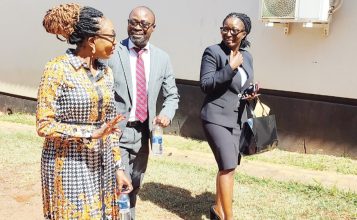Majority see corruption fight as lipservice—Report
Most Malawians see the fight against corruption in the country as lacking action because not much is being done to investigate suspected corrupt individuals in political leadership, according to Ministry of Justice and Constitutional Affairs findings.
The findings indicate that many sectors feel politicians are corrupt because they are attracted to politics for financial gains rather than serving the nation.

The findings, contained in a 20-page Consultation Paper developed by the Ministry of Justice and Constitutional Affairs, come ahead of the two-day Anti-Corruption National Conference starting today in Lilongwe.
The paper, ‘The Fight Against Corruption in Malawi’, was developed from a consultative process the ministry, led by Minister of Justice and Constitutional Affairs Samuel Tembenu, undertook between January and March this year.
But government has insisted that while people have the right to their perceptions, there is strong political will from the leadership in fighting corruption.
In the paper, the ministry said it discovered that Malawians also feel that politicians use the fight against corruption as a tool to victimise opponents.
Further, the consultations also revealed that political organisations’ funding is a fertile ground for condoning and promoting corrupt practices.
Thus, the ministry feels, there is need to reform the way political parties are financed as corruption usually occurs “due to the way political parties are resourced”.
But political scientist Mustapha Hussein observed that the issue of political will does not only apply to the current administration but all regimes during the multiparty dispensation.
Said Hussein: “The United Democratic Front [UDF] regime was associated with fiscal indiscipline and corrupt practices and this culminated in the president himself [Bakili Muluzi] being accused of siphoning donor money into his private bank accounts.”
Hussein added that during the terms of Bingu wa Mutharika (deceased) and Joyce Banda, despite hyping the zero-tolerance stance, auditors revealed that billions were stolen while Mutharika’s wealth attracted controversy and Banda was implicated in Cashgate.
In the present administration, Hussein said the issue of former minister of Agriculture, Irrigation and Water Development George Chaponda remains a debate on the issue of political will.
However, government spokesperson Nicholas Dausi, who is also Minister of Information and Communications Technology, insisted there is political will from the leadership.
On his part, anti-corruption advocate Levi Mihowa faulted the public for taking the fight against corruption to be seen as a government undertaking.
“That’s not the approach, the public must always have its ears and eyes open and expose corrupt issues. If government is rhetoric, then the public is also rhetoric, we must not hold on to vital information,” he said.
Latest statistics indicate the country continues to lose millions of kwacha through corruption, thereby affecting business and national development.
According to the 2017 Transparency International (TI) corruption index released in January, the vice has worsened over the last few years as the country has drastically moved from position 88th in 2012 to 120 in 2016. n






NdizoonaI corruption is being fought kwa osauka…. Bwanji a Achaponda sadamangidwe…Tili ndi mtsogoleri wopanda chilungamo.. someone is comming adzamangidwa anthu amenewa….